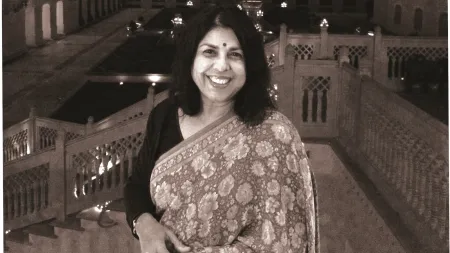What causes cervical cancer that claimed reality TV personality Poonam Pandey’s life
The official Instagram page of actress and reality TV personality Poonam Pandey announced her passing this morning. Poonam, aged 32, succumbed to cervical cancer.
Pandey’s manager, Nikita, confirmed her passing to the Indian Express, stating, “She died peacefully at her residence in Uttar Pradesh.” The news came as a shock to many, while others expressed scepticism due to recent public appearances and social media activity.

View this post on Instagram
A post shared by Poonam Pandey (@poonampandeyreal)
Dr Manish Machave, consulting obstetrician, gynaecologist & gynaecological endoscopic surgeon, Ruby Hall Clinic, Pune, defined cervical cancer as a disease in which cells in the body grow out of control, primarily affecting individuals with a cervix.
Despite being preventable through vaccination and treatable if detected early, cervical cancer continues to pose challenges, especially in developing countries. According to Dr Machave, it is highly susceptible in those aged 30 and above.
This tragic news coincides with the recent Indian government announcement by Finance Minister Nirmala Sitharaman to include the human papillomavirus (HPV) vaccine in its national immunisation program. Poonam’s passing underscores the importance of cervical cancer awareness and prevention. The inclusion of the HPV vaccine in the national immunisation program promises significant strides in protecting young women from this potentially life-threatening illness.
“The primary driver of cervical cancer is persistent infection with specific strains of human papillomavirus (HPV). HPV, a prevalent virus transmitted through sexual activity, is encountered by at least half of sexually active individuals at some point in their lives. However, only a small percentage will develop cervical cancer as a result,” Dr Machave explained to indianexpress.com in an interaction.
Other factors contributing to cervical cancer risk include early marriage, multiple pregnancies, and lack of preventive measures such as vaccination and screening, said Dr Machave.
What are the symptoms of cervical cancer?
Cervical cancer may manifest through various symptoms noted Dr Machave, including:
- Constant bleeding, spotting between periods, or after menopause.
- Heavier and longer menstrual bleeding than usual.
- Watery, foul-smelling vaginal discharge, particularly in advanced stages.
- Pelvic pain or pain during intercourse, as the cancer progresses and affects nearby tissues.
- Pain during urination or blood in urine.
- Weight loss without apparent reason.
- Fatigue.
- Swelling in legs.
- Back pain or leg pain.
- Difficulty in controlling urine or bowel movements in advanced stages.
How can cervical cancer be prevented?
Cervical cancer is preventable through various measures, according to Dr Machave.
HPV Vaccination: Starting between ages 9 and 12, with catch-up vaccinations available until age 26, significantly reduces the risk of cervical cancer. Vaccination schedules involve multiple doses administered at specific intervals, offering protection against HPV strains associated with cervical cancer.
Regular Screening: Pap tests and HPV tests are crucial for early detection. Routine screenings starting at age 21, repeated every few years, help detect precancerous conditions early, allowing for monitoring or treatment to prevent cervical cancer development.
Awareness and Education: Increasing awareness, especially in underserved communities, about cervical cancer, its symptoms, and the importance of vaccination and screening is essential for prevention efforts.
Access to Affordable Treatment: Ensuring access to affordable and quality treatment for diagnosed cases is vital, addressing financial barriers and disparities in healthcare services distribution.
 January is marked as cervical cancer awareness month (Source: Freepik)
January is marked as cervical cancer awareness month (Source: Freepik)
What does the treatment of cervical cancer include?
Treatment options for cervical cancer vary depending on the stage and severity but may include surgery, radiation therapy, chemo, targeted and immunotherapy at early levels.
Focusing on relieving symptoms and improving quality of life is of paramount need, especially in advanced stages where curing the cancer may not be possible.
The suggested age to start the vaccination is between 9 and 12 years, and individuals can receive catch-up vaccinations until the age of 26.
How often should a woman screen herself for cervical cancer and other forms?
Routine Pap tests are recommended, starting at age 21, and repeating every few years, said Dr Machave. The frequency may vary based on individual risk factors, and healthcare providers may recommend more frequent screenings for those at higher risk.
HPV testing may also be combined with Pap tests for more accurate results.
Regular screenings provide an opportunity to detect precancerous conditions early, allowing for monitoring or treatment to prevent the development of cervical cancer.
Disclaimer: The copyright of this article belongs to the original author. Reposting this article is solely for the purpose of information dissemination and does not constitute any investment advice. If there is any infringement, please contact us immediately. We will make corrections or deletions as necessary. Thank you.





